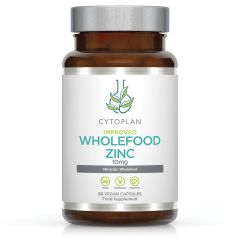While we typically associate bugs and colds with the darker, colder winter months, this summer, in the UK, we are seeing a rise in illnesses. Certain strains of Covid, whooping cough, as well as the flu and nasty sickness bugs are all doing the rounds. While the weather warms up, many of our activities see us mingling in crowded spaces – think gigs and festivals, sports days, BBQs… and this gives viruses and bacteria the perfect opportunity to spread. So, it is now as important as ever to support a healthy immune system and protect yourself from succumbing to illness so you can enjoy a healthy, happy summer.
How to support your immune system this summer
A healthy, balanced diet is essential for the optimal function of every part of our bodies, including our immune systems. Unfortunately, the typical Western diet, with high levels of processed foods, refined carbohydrates and added salt and sugars tends to be low in vitamins, minerals and fibre and can contribute to inflammation and immune dysregulation.
The good news? It is perfectly possible to turn around an unhealthy diet to support optimal health and immunity this Summer – and here are some great ways to achieve that:
1. Eat a rainbow
The benefits of eating plenty of fruit and vegetables for our health is well known, and supporting healthy immunity is just one of the many benefits of getting your 5-a-day (although striving towards 8-12 a day is even better!). Eating a wide variety of different colours of plant foods each day will nourish you with a broad range of vitamins, minerals, fibre and protective phytonutrients, all of which will work together to support optimal immune function. Summer is a great time to introduce a range of colourful seasonal salads and vibrant fruits to boost your plant-food intake.
2. Focus on healthy fats
Although inflammation is a normal, and important response to acute stress or injury, many of us are living with long-term inflammation, which can suppress your natural immunity. As mentioned, the typical Western diet can be highly inflammatory, but by increasing your intake of omega-3 fatty acids through foods such as nuts and seeds (chia and flax) and their oils, and cold-water oily fish, you can support your anti-inflammatory pathways. Extra virgin olive oil is also a great source of healthy fats and phytonutrients and tastes delicious drizzled over summer salads.
3. Support your gut health
This is key to supporting optimal immunity. Up to 80% of our immune cells are found in the gut, in something that is referred to as our “gut associated lymphoid tissue” (GALT) and scientists believe that the human immune system has evolved alongside our microbiome to protect against pathogens. Therefore, supporting the health of the gut and the microbiome can directly influence our immune health.
You can support a balanced microbiome by ensuring a good level and variety of dietary fibre, which will provide a range of prebiotics – specific fibres that can be digested by your gut bacteria to promote the growth and diversity of the microbiome. Eating a wide variety of different fruits and veggies each day (remember – aim for 8-12!) is a great way to support a diverse, healthy gut. Probiotic foods such as kefir, sauerkraut and natural live yoghurt – which provide a natural source of beneficial bacteria, can also be supportive.
Supplements that can help support your immune system
For peak immune health, it can be helpful to supplement with some key nutrients alongside a healthy diet, to ensure optimal levels:
Vitamin D
Known as the “sunshine vitamin” because exposure to sunlight is the best natural source, Public Health England recommend everyone takes a vitamin D supplement in autumn/winter, when we can’t make vitamin D from sunlight because the sun is too low in the sky. That being said, we aren’t guaranteed sunny days over the summer (and they certainly seem to have been few and far between this summer so far!) and several of us avoid sun exposure, so many people in the UK could benefit from continuing to take a vitamin D supplement year-round. We recommend that if you are taking more than 5000i.u. per day for longer than 2-4 months, you check your vitamin D levels via a blood test.
Zinc
Zinc is an essential trace element that is crucial for growth, development, and the maintenance of optimal immune function, and a deficiency of zinc can lead to a weakened immune defence. Zinc has a particular influence on antiviral immunity, so is one nutrient to ensure you have great levels of to reduce the risk of summer colds and flu.
Vitamin C
Vitamin C is essential for a robust immune system in several ways, as it supports the function of a range of immune cells and enhances their ability to protect against infection. It is a powerful antioxidant and has natural antihistamine properties so can also be a key nutrient to protect against seasonal allergies.







